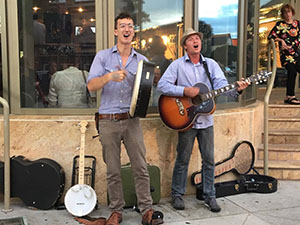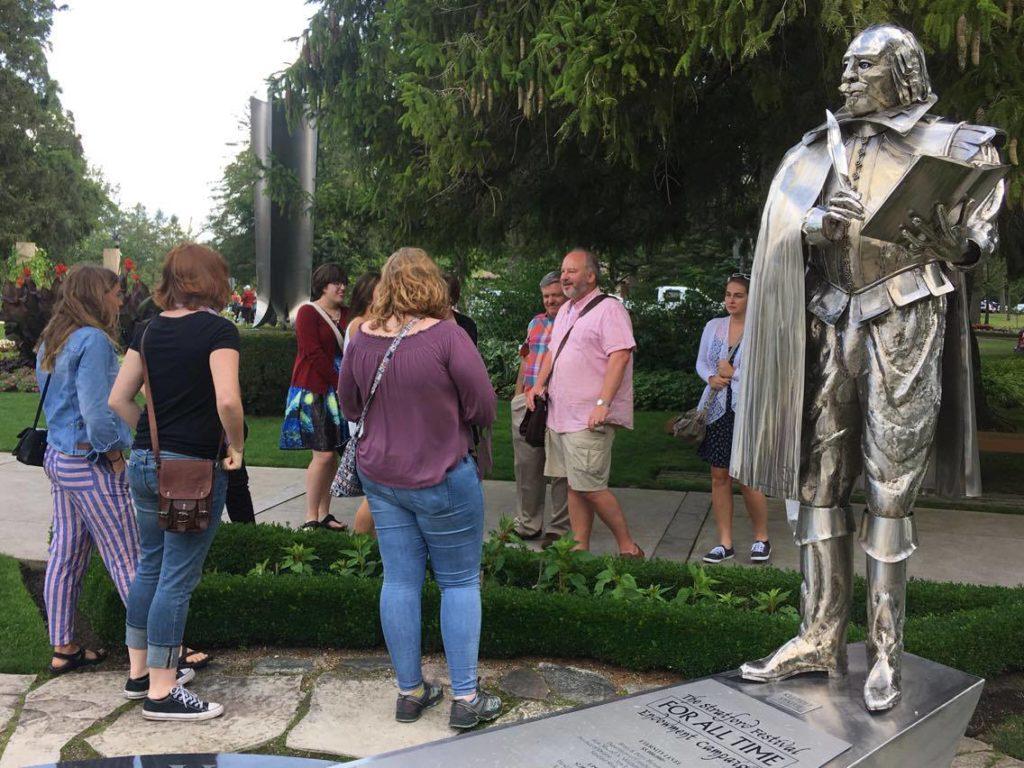The week before fall semester started, Aug. 21 to 25, 10 NMU students and two faculty enjoyed a whirlwind journey to Stratford, Ontario to watch six top-notch theater performances in three days—and I was lucky enough to be among them.
Over the summer, our group prepared for the plays we’d see by reading the written texts and taking diligent notes. Our expectations mounting, we hopped into a 12-passenger van, left Marquette and headed south (yes, south) toward Canada. We spent one night at a hotel downstate in Birch Run, Michigan before crossing the border and exchanging our money for maple syrup scented dollars.
Professor David Wood, Ph.D. in English Renaissance drama, and history professor Chet DeFonso, whose handy knowledge of Canada and perspective as a Marquette stage actor himself, led the expedition.
“I get to see so much more through these students’ eyes,” Wood said, beaming. “The coolest part of my job is taking students and watching them be in shock at seeing world-class productions of Shakespeare. There’s nothing cooler than that—and it’s regardless of major.”
 Ours was indeed a diverse group of interests, with not just English or theater majors but also those in subjects from philosophy to medicinal plant chemistry. Between performances and exploring the beautiful city of Stratford, our group got to bounce ideas off each other.
Ours was indeed a diverse group of interests, with not just English or theater majors but also those in subjects from philosophy to medicinal plant chemistry. Between performances and exploring the beautiful city of Stratford, our group got to bounce ideas off each other.
“I knew I was going to enjoy the plays, but I liked talking about and analyzing the plays with everybody,” social work junior Hayley Buckhout said. “I liked getting to know each other and to hear each other’s points of view.”
The Stratford Festival, which began in 1953, brings to life masterpieces from Shakespeare and other playwrights of yesteryear, as well as some contemporary Canadian works, to engage the audiences of today.
One of the plays we viewed was “Tartuffe,” a 17th century satire comedy by the French playwright Moliere. Its humor adapted well but it was contemporized a bit, with one character even proclaiming melodramatically “Unfollow me,” as well as references to Donald Drumpf’s tweets. Also, from the balcony seats of the ornate Avon Theatre we saw the Gilbert and Sullivan comic opera “H.M.S. Pinafore” which was a huge hit in 1878, the “Hamilton” of its time.
The festival is what is called true repertory theater. That means that each of the three theaters in town performs two different plays each day—one in the afternoon, the other that night—and each cast member acts in two or three different productions. Stage crews have only a few hours between performances to change the sets for the next play; and, for example, an actor that plays the comic relief in a matinee might have the role of a dastardly villain that same night.
This rotation added a level of energy and passion to each production. We were impressed by the skillful performances, finding ourselves enraptured.
“You forget the world around you and just get wrapped up in the play like there’s nothing else,” sophomore psychology major Jailin Kaiser said.
Wood has been attending since 2009, with DeFonso joining him since 2013. With these years of experience, Wood and DeFonso know how to pack in the fun for the five-day trip, which includes not only seeing plays but also tours of the labyrinthine backstage of the Festival Theatre and also of the costume and prop warehouse, which is 111,000 square foot (or 6.5 hockey arenas, as our tour guide said) and includes over 65,000 ready-for-stage items.
We also had a formal luncheon with retired NMU trustee Sook Wilkinson and current trustee Tami Seavoy and their spouses, who also attended many of the plays with us. The trustees “picked our brains,” as Wood phrased it, and got to know not only what we thought of the dramas but also our aspirations for the future. For many students, this trip had a huge impact.
Emily Maynor, junior secondary education major, had been nervous about having to teach period theater someday in English class to her future high school students, since merely reading the plays left her in confusion.
“Everything is so different on the stage,” Maynor explained. “I’ve never seen productions like this. I read the plays on the page—it just felt cold reading them—I couldn’t envision them until this. But seeing them felt complete. We got to see characterization, setting, how they’re intended to be performed. This will help me to teach them better in the future.”
Each night we also wrote journal entries, recording our impressions of the plays so that we can review them later when we write our final analysis papers during the fall semester as the other aspect of the class.
“Students read and prepare months beforehand, then they have their expectations either confirmed or shattered. It’s an intense week, and that earns you the right to wrestle with the text for months,” Wood explained.
The Stratford Festival Program Endowment, which was established by a gift from CAPS professor Emeritus and theater lover Robert Dornquast, helps fund the majority of the expenses for the trip, including travel, tickets and lodging. Therefore, students only pay $300, plus expenses for meals and any souvenirs students might wish to purchase. Furthermore, the program functions as a fall semester class, so it’s included in the normal tuition, all of which is much appreciated.
“To have a fund like Dornquast’s is a miracle,” Wood said. “It’s a miracle to be able to offer world-class theater to students.”






























